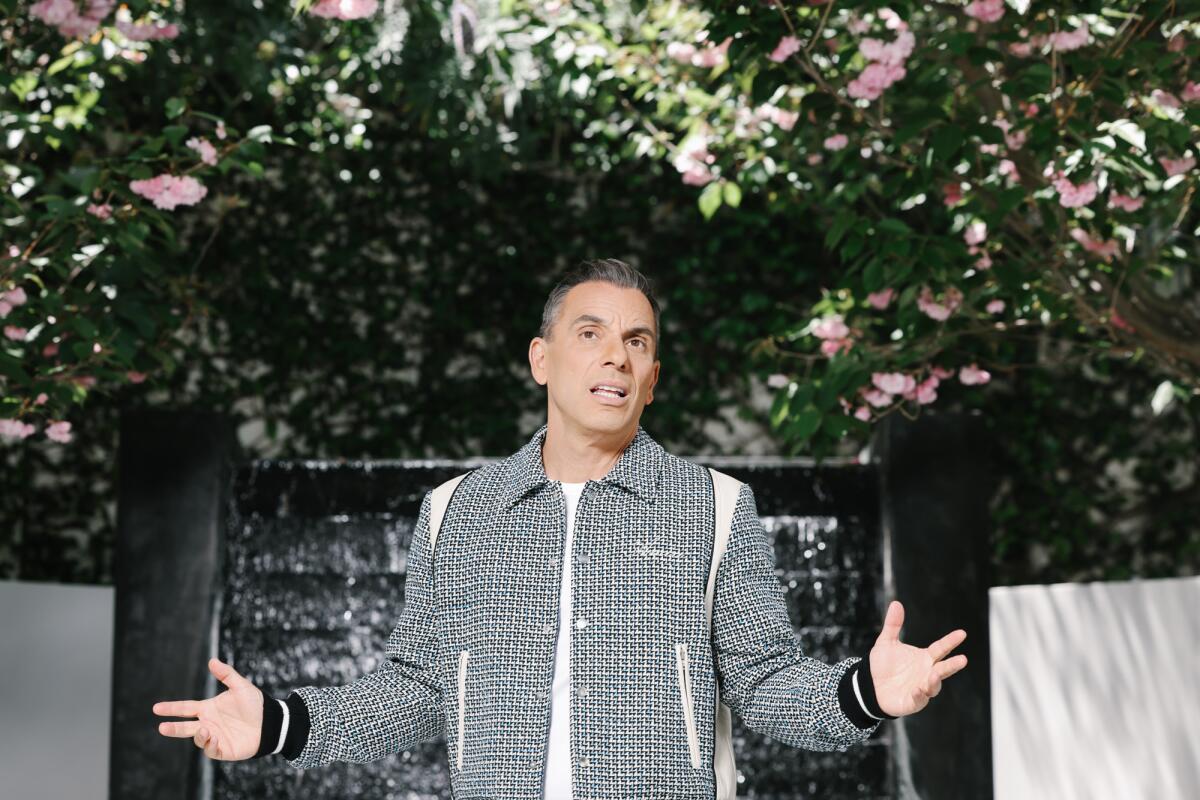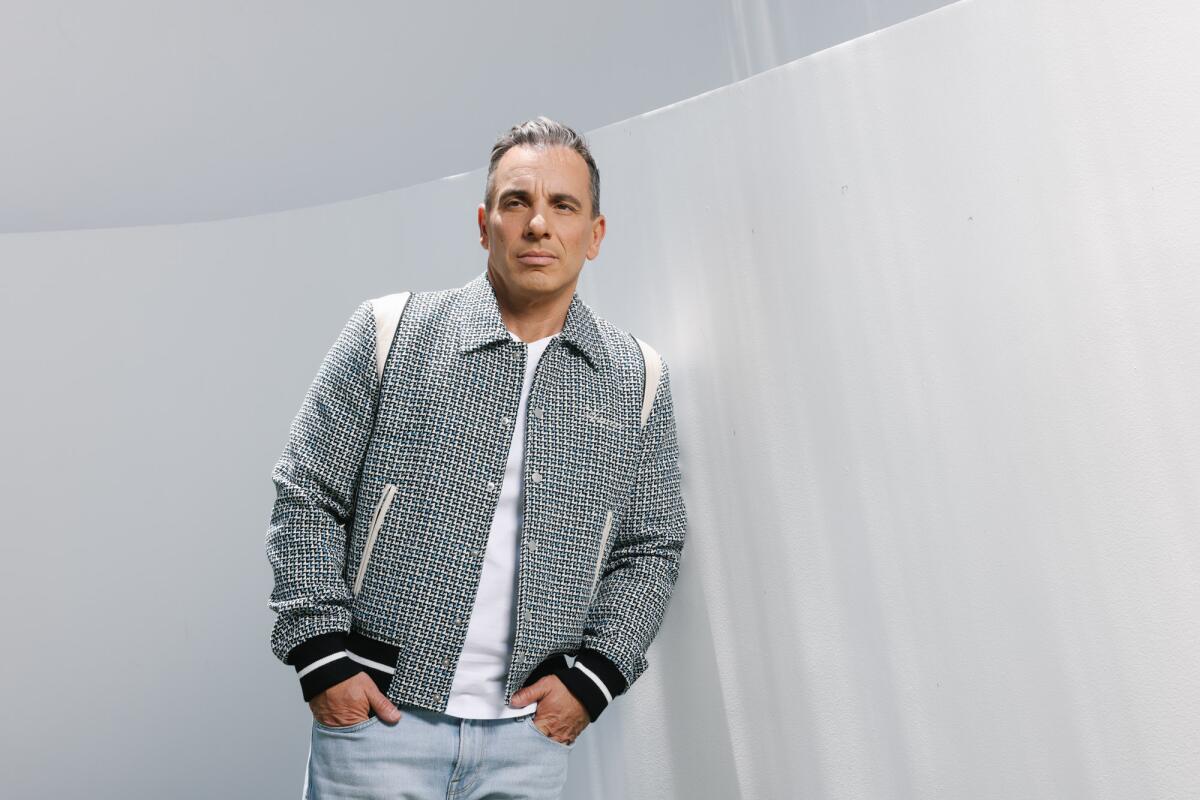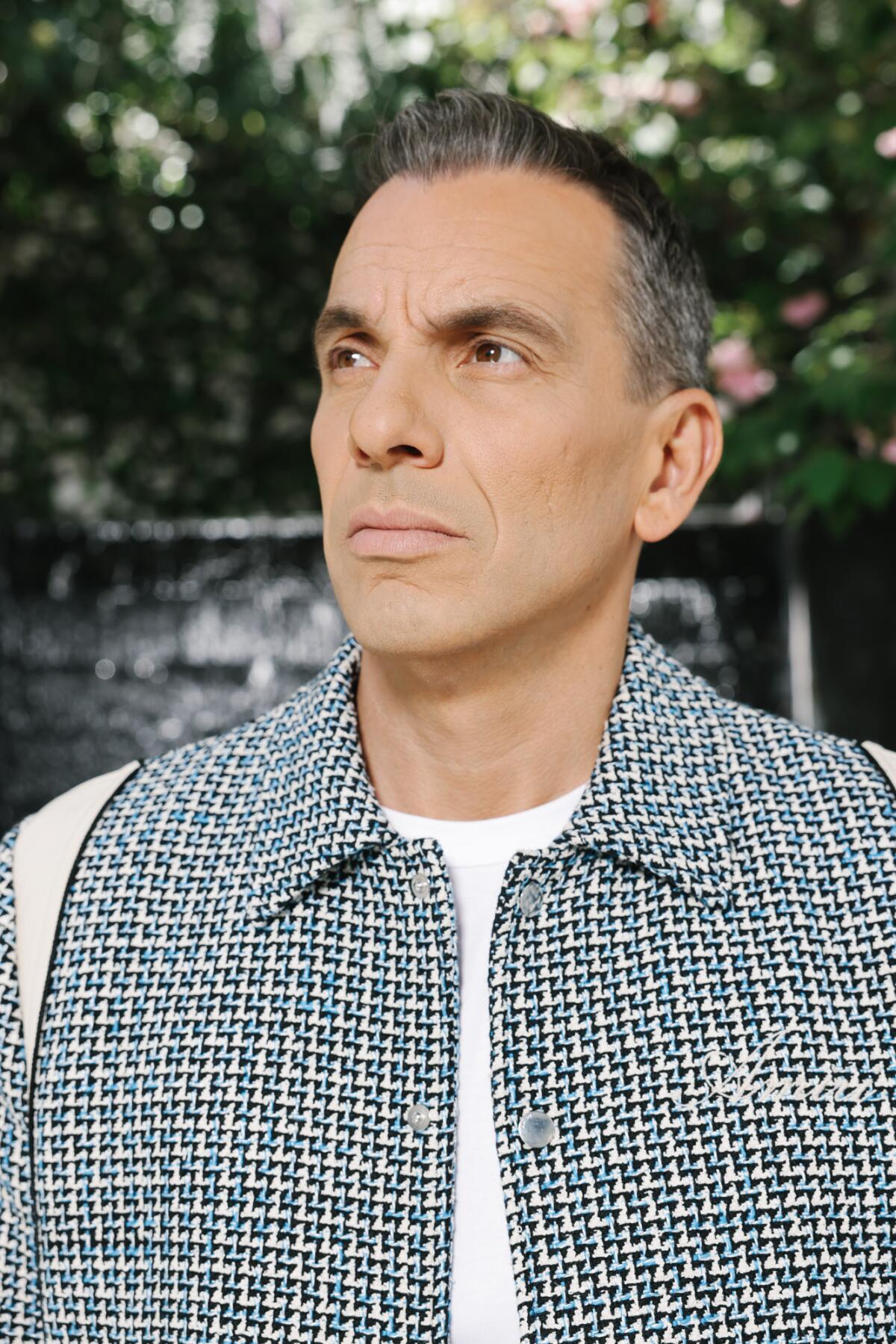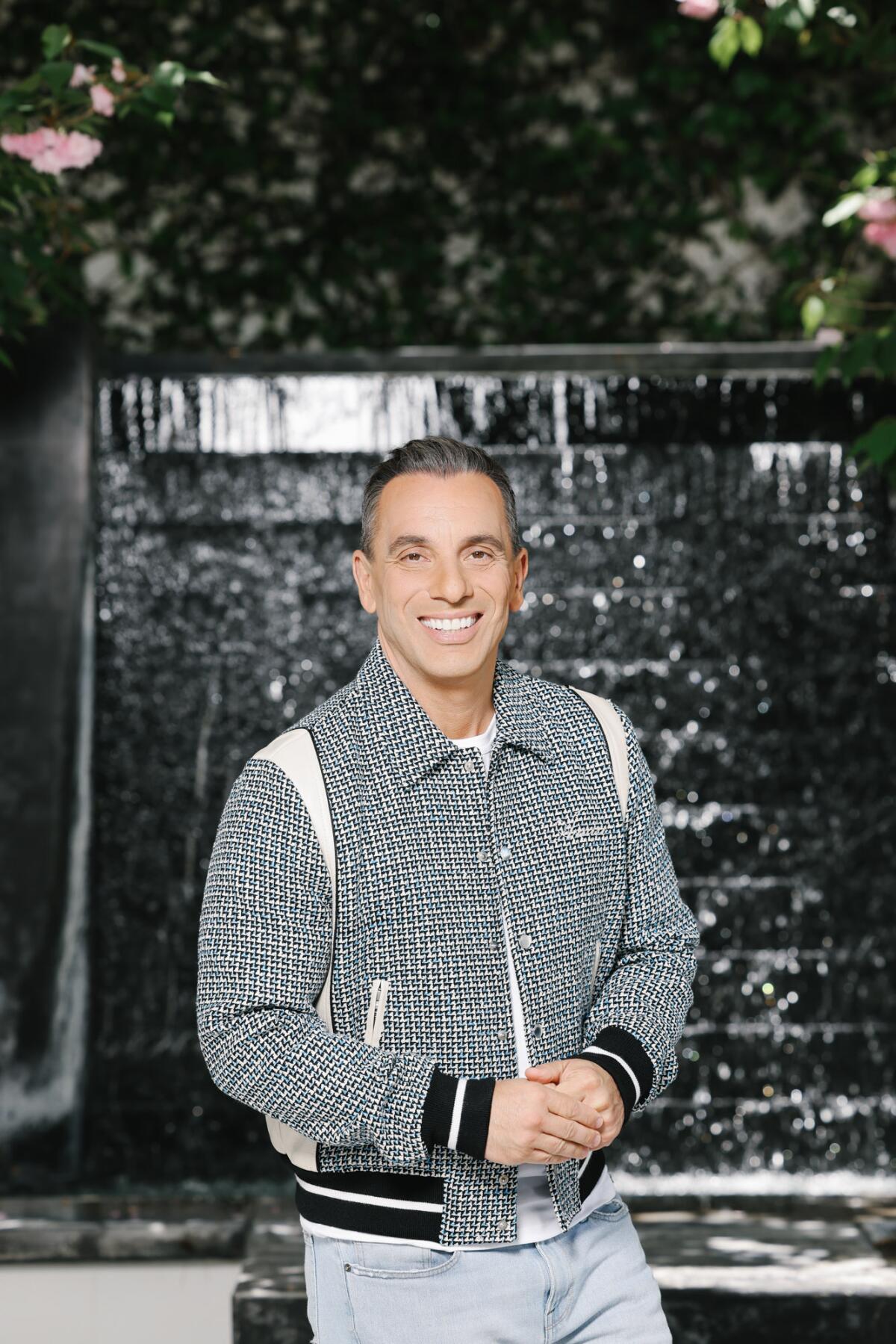Comedian Sebastian Maniscalco got a masterclass in acting from Robert De Niro in ‘About My Father’

- Share via
Growing up in Chicago, Sebastian Maniscalco had four pencil-drawn portraits hanging on his wall: of Sylvester Stallone, Joe Pesci, Al Pacino and Robert De Niro.
“It was like the Italian Mt. Rushmore,” he says.
Now, De Niro is playing Maniscalco’s dad in a feature film — “About My Father” — loosely based on the comedian’s relationship with his real father. On one of many pinch-me days, Maniscalco’s dad visited the set in Alabama; the real Salvo Maniscalco is a veteran hairdresser in Chicago, and De Niro wanted him to demonstrate how to dye a woman’s hair for a scene in the movie.
“My father was there teaching him how to foil and this and that,” says Maniscalco. “I’m sitting here in the salon — it looked like my dad’s, the first salon he ever had — and I couldn’t believe it. I go: ‘My dad is teaching Robert De Niro how to do hair.’”
Life has taken several surreal turns for Maniscalco — a rubbery, lovably irritable stand-up comedian — who turns 50 in July. Besides the new movie, which he co-wrote and starred in, he has a bit part in the biggest hit of the year — “The Super Mario Bros. Movie” — and he leads the cast of a new comedy series, “How to Be a Bookie,” due later this year.
I visited him on the set of the Max show on a day when they were shooting a funeral scene at a real mortuary in Altadena. Maniscalco, wearing a black suit, was talking to the deceased — an actor lying perfectly still, even between takes — in an open casket.
“Closest thing I’ve had to a father,” he said to his partner in the scene.
Watching take after take from the monitor bay, showrunner Chuck Lorre and his producing partner Nick Bakay gave audible feedback at laugh lines. Maniscalco says having their laughter in his ears lets him know the comedy is working — something he didn’t have on the set of “About My Father.”
He was already stressed about being away from his young family for seven weeks, carrying an entire movie on his back and feeling some impostor syndrome about being an actor.

Recent projects for Maniscalco besides “About My Father include “The Super Mario Bros. Movie” and Max series “How to Be a Bookie.”
“With stand-up comedy,” he says, “you know how you’re doing in the moment, you could pivot and go: ‘OK, that didn’t work. Let me do this. I know this is gonna work.’ In a movie, they yell, ‘Cut’ — and I’m a comedian ... I’m, like, looking for a standing ovation. You don’t get that validation.”
The thing is, he always wanted to be an actor. Maniscalco moved to Los Angeles in 1998, fueled by his worship of guys like De Niro, to try and break into showbiz. He went out on auditions for parts, but says he wasn’t any good.
“I think I booked one walk-on part as a bouncer on a TV show in 2006,” he says.
So, when he wasn’t waiting tables at the Four Seasons in Beverly Hills, he gravitated toward stand-up. He’d been a cut-up since he was a kid, and this seemed like a better fit for his lone wolf personality. Training at the Comedy Store, he outgrew his initial angry style to a more physical, facially expressive persona with material about his dad, his childhood and things that annoy him.
Salvo, and the Italian American experience, figured into his material; one of Maniscalco’s famous early bits involves his dad poisoning possums by spiking baloney with antifreeze, although that was actually something a friend’s father did. But Salvo’s hard-nosed wisdom and criticism of his son were relatable and hilarious — and Maniscalco says he even inherited some of his comic gifts from his father.
“I am more of a facial funny,” Salvo says from Chicago. “When you see me, my expression, my face tell people how I feel inside of me.”
Maniscalco’s act won over the club, then theaters. He has made numerous specials — including last year’s “Is it Me?” for Netflix — and sold out Madison Square Garden four nights in a row.
From then on for auditions, he often had fans in the room. That’s how he booked a role in the Oscar-winning “Green Book,” which then led to a small part as a mobster in Martin Scorsese’s “The Irishman,” where he got to tell De Niro’s character to “get the f— out of here.”
One of the most important acting lessons he’s discovered is simply “to make very strong choices,” Maniscalco says. “And whether or not those choices are good, at least you’re coming in there with a point of view.”
For instance: He actually auditioned for the role of Mario, and went in swinging with the full “It’s-a-me!” shtick in a squeaky Italian accent.
“And they were looking at me like, ‘What the f— is this guy doing?’” he says. “But yeah, I think it’s all in the confidence. I know that with stand-up comedy, regardless of what it is, if you’re committed to it, the audience is with you. As soon as they see that you’re not totally 100% believing what you’re saying, they know.”
(He ended up playing the smaller role of Spike the foreman.)

“I think it’s all in the confidence. I know that with stand-up comedy, regardless of what it is, if you’re committed to it, the audience is with you,” says Sebastian Maniscalco.
Maniscalco got a free masterclass in acting from De Niro on “About My Father.”
“I would walk into a scene, hit my mark, say the line,” he says. “With him, he’s looking to do what they call ‘business,’ so he would get into a scene and play with something, or he was actually packing [a suitcase]. And it really adds a lot to the environment and to the scene when somebody is doing something. It’s real.”
There’s a climactic scene that takes place on a tarmac, and Maniscalco was supposed to come into it out of breath, then begin to cry. He was suffering severe pain from a persistent sciatica in his right leg, which was ablaze as he kept jogging around the tarmac to try to stick the landing.
“I’m doing the scene — I ain’t cryin’,” he says. “De Niro’s cryin’. De Niro’s cryin’ so good that I’m looking at him going: ‘This guy’s amazing.’ ‘Cut!’ Come into the scene again. Still no cry. So I go to De Niro, I go, ‘Bro, I have a problem here. You gotta help me out.’”
De Niro took Maniscalco aside, into an airplane sitting on the runway, and told the comedian how he works up emotion on cue by thinking about things in his real life.
“I’ve got a son your age and I think about him,” he told Maniscalco. Then De Niro starts to cry, Maniscalco says: “He’s cryin’ talking about how he cries. And I start to cry. And I go, ‘I gotta use this!’”
De Niro, a veteran actor who has learned how to drive cabs and speak authentic Sicilian, took his comedic part as Salvo Maniscalco as seriously as any other. He flew Salvo out to the Oklahoma set of Scorsese’s “Killers of the Flower Moon” so he could shadow the hairdresser he’d been hired to play.

Maniscalco originally moved to L.A. to pursue acting. After succeeding as a comedian instead, his film career is taking off.
“He wanted to know how my dad wore his hat, how he smoked a cigar, how he put his jacket on,” says Maniscalco. “You know, really intimate details of how he behaves. So much so that my father’s like, ‘F—, this guy’s workin’ me to death. I thought I was gonna come out here a couple hours. ... Spent seven hours with this guy!’”
Sebastian and Salvo have always had a strong bond — the comedian idolized his dad growing up, borrowing his clothes in high school and at one point asking his dad to give him a perm — but Salvo would also provide a lot of unrequested critical feedback on everything from his son’s soccer games to his stand-up routines.
“I used to go between shows to tell him about what I thought about certain jokes,” says Salvo. “I used to tell him, ‘You know that joke that you told them on the stage? Throw it in the garbage, ’cause the audience are not laughing at it.’”
Maniscalco says he appreciates having an unvarnished voice in his life, in a business where sycophants only blow smoke, but over the years his dad also learned that it was more helpful not to voice every criticism.
When Salvo saw the finished “About My Father” for the first time, he cried.
“Family, to me, means a lot,” he says. “It means everything, really. I always believe in family.”
More to Read
Only good movies
Get the Indie Focus newsletter, Mark Olsen's weekly guide to the world of cinema.
You may occasionally receive promotional content from the Los Angeles Times.










